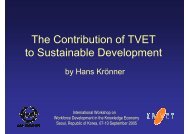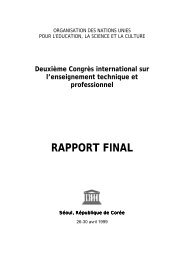Learning for Life, Work and the Future Initial ... - Unesco-Unevoc
Learning for Life, Work and the Future Initial ... - Unesco-Unevoc
Learning for Life, Work and the Future Initial ... - Unesco-Unevoc
Create successful ePaper yourself
Turn your PDF publications into a flip-book with our unique Google optimized e-Paper software.
Page 88 Participants’ Papers <strong>Learning</strong> <strong>for</strong> <strong>Life</strong>, <strong>Work</strong> <strong>and</strong> <strong>the</strong> <strong>Future</strong><br />
all key skills employability skills? Are all<br />
employability skills key skills?<br />
8. Changing <strong>the</strong> Focus from Key Skills<br />
to Key Problems<br />
Key skills development fits naturally within a<br />
curricular approach that utilizes key problems as a<br />
learning strategy. Reflection upon key problems can<br />
give insight into practice <strong>and</strong> provide ideas about how<br />
students might tackle similar problems in <strong>the</strong> future.<br />
It provides a framework <strong>for</strong> continuing professional<br />
development.<br />
The focus on key problems can help in establishing an<br />
appreciation of <strong>the</strong> complexity <strong>and</strong> relatedness of<br />
issues <strong>and</strong> it can be used to facilitate both practical <strong>and</strong><br />
<strong>the</strong>oretical learning. The notion of key problems is<br />
transferable in an unthreatening way, as each vocational<br />
area would have to define <strong>the</strong>se <strong>for</strong> itself.<br />
9. How Should Key Skills Be Taught?<br />
Assuming that ‘key skills’ – whatever <strong>the</strong>y might be –<br />
can/have been identified, how should <strong>the</strong>y be covered<br />
in a curriculum? Research findings on <strong>the</strong> effectiveness<br />
of different approaches to teaching key skills indicate<br />
that <strong>the</strong> latter are most effectively learned when:<br />
• Fully integrated into <strong>the</strong> subjects of <strong>the</strong> programme<br />
followed by <strong>the</strong> learners. Key skills do not have an<br />
independent meaning, but acquire meaning within a<br />
specific context. Covering ‘key skills’ as st<strong>and</strong>alone<br />
units/modules was found not to be effective,<br />
as ‘transfer’ did not occur. Sticht (1989) reported<br />
that “programs that offer basic skill training prior to<br />
<strong>and</strong> separated from vocational programs are not<br />
particularly effective in improving ei<strong>the</strong>r basic<br />
skills or vocational knowledge”. Accreditation of<br />
free st<strong>and</strong>ing ‘key-skill’ units would give credit to<br />
decontextualised learner’s per<strong>for</strong>mance <strong>and</strong> <strong>the</strong><br />
credibility of such accreditation is in question<br />
(Wilmut et al. 1997). Key skills cannot be taught or<br />
assessed in isolation from a context. There is no<br />
research evidence to suggest that development of a<br />
key skill in one context will result in <strong>the</strong> spontaneous<br />
transfer to ano<strong>the</strong>r significantly different<br />
context.<br />
• Per<strong>for</strong>mance outcomes <strong>for</strong> <strong>the</strong> key skills have been<br />
explicitly included in each unit specification <strong>and</strong><br />
evidence to be produced indicated. For effective<br />
learning of key skills, <strong>the</strong>y must be included in <strong>the</strong><br />
per<strong>for</strong>mance criteria <strong>and</strong> evidence requirements of<br />
each unit/module in <strong>the</strong> vocational area.<br />
• A participative, learner-centred teaching approach<br />
is used. A teacher-centred approach was found to<br />
be far less effective than an approach in which roleplay,<br />
problem solving, group discussion, etc. was<br />
used.<br />
• A setting is used which closely mirrors real life <strong>and</strong><br />
workplace situations. Learners must be able to see<br />
<strong>the</strong> direct relevance of <strong>the</strong> skill to <strong>the</strong>ir own future<br />
in <strong>the</strong> world of work or adult life.<br />
• Teachers in <strong>the</strong>ir own classroom/workshop practice<br />
<strong>and</strong> personal/social life demonstrate <strong>the</strong> attitudes,<br />
values <strong>and</strong> skills <strong>the</strong>y expect learners to develop.<br />
Attitudes <strong>and</strong> values espoused without <strong>the</strong>ir being<br />
enacted in <strong>the</strong> teacher’s own life have no transfer<br />
value. (Stasz, et al., 1993; Herr <strong>and</strong> Johnson, 1989;<br />
VEW, 1993).<br />
10. Proposals<br />
It is proposed that<br />
• A regional consultative meeting/workshop on keyskills<br />
issues be organized<br />
• A regional key-skills network be established.<br />
11. Expected Outcomes<br />
• Clarification of <strong>the</strong> ‘key-skills’ concept <strong>and</strong> its<br />
place, if any, in <strong>the</strong> new vocational curricula in <strong>the</strong><br />
region<br />
• A database with examples/ideas of key-skills<br />
activities in all vocational areas<br />
• An in-service training pack on ‘including key skills<br />
in <strong>the</strong> vocational areas’, with examples in each<br />
vocational unit to show how key skills can be<br />
included<br />
• Student learning packs/modules (<strong>for</strong> full-time <strong>and</strong><br />
distance education in various vocational areas,<br />
including teacher training) with key-skills activities<br />
integrated <strong>and</strong> included in <strong>the</strong> per<strong>for</strong>mance criteria<br />
so that evidence has to be ga<strong>the</strong>red.<br />
Bibliography/References<br />
American College Testing (ACT), (1994), The <strong>Work</strong> Keys<br />
System, ACT, Iowa City.<br />
Berryman, S. E. (1991), Designing Effective <strong>Learning</strong><br />
Environments: Cognitive Apprenticeship Models,<br />
Columbia University, New York.<br />
Botswana, Republic of (1993), Report of <strong>the</strong> National<br />
Commission on Education (RNCE), Government<br />
Printer, Gaborone.<br />
Botswana, Republic of (1997), National Development Plan<br />
8, 1997/98-2002/03, Government Printer,<br />
Gaborone.<br />
Breirer, M. (1998), The Role of <strong>the</strong> Generic Skill in <strong>Life</strong>long<br />
<strong>Learning</strong>: Panacea or Pipe-Dream? In Journal of<br />
Education 23(1), pp74-100.<br />
Brown, A. (1998), Going Dutch? Changing <strong>the</strong> Focus from<br />
Core Skills to Core Problems in Vocational Higher<br />
Education. Paper presented at a Higher Education<br />
<strong>for</strong> Capability Conference on Embedding Key<br />
Skills across <strong>the</strong> Curriculum.





